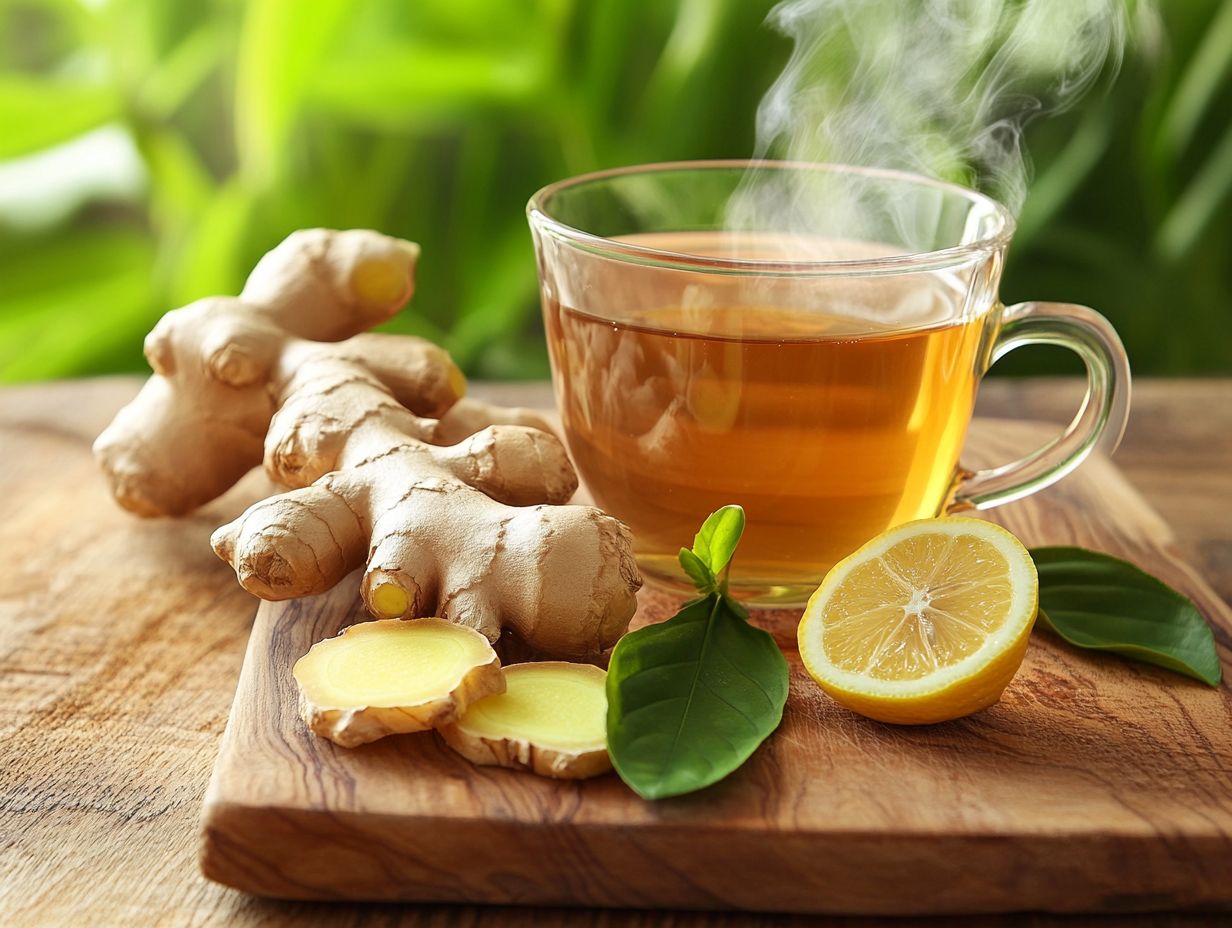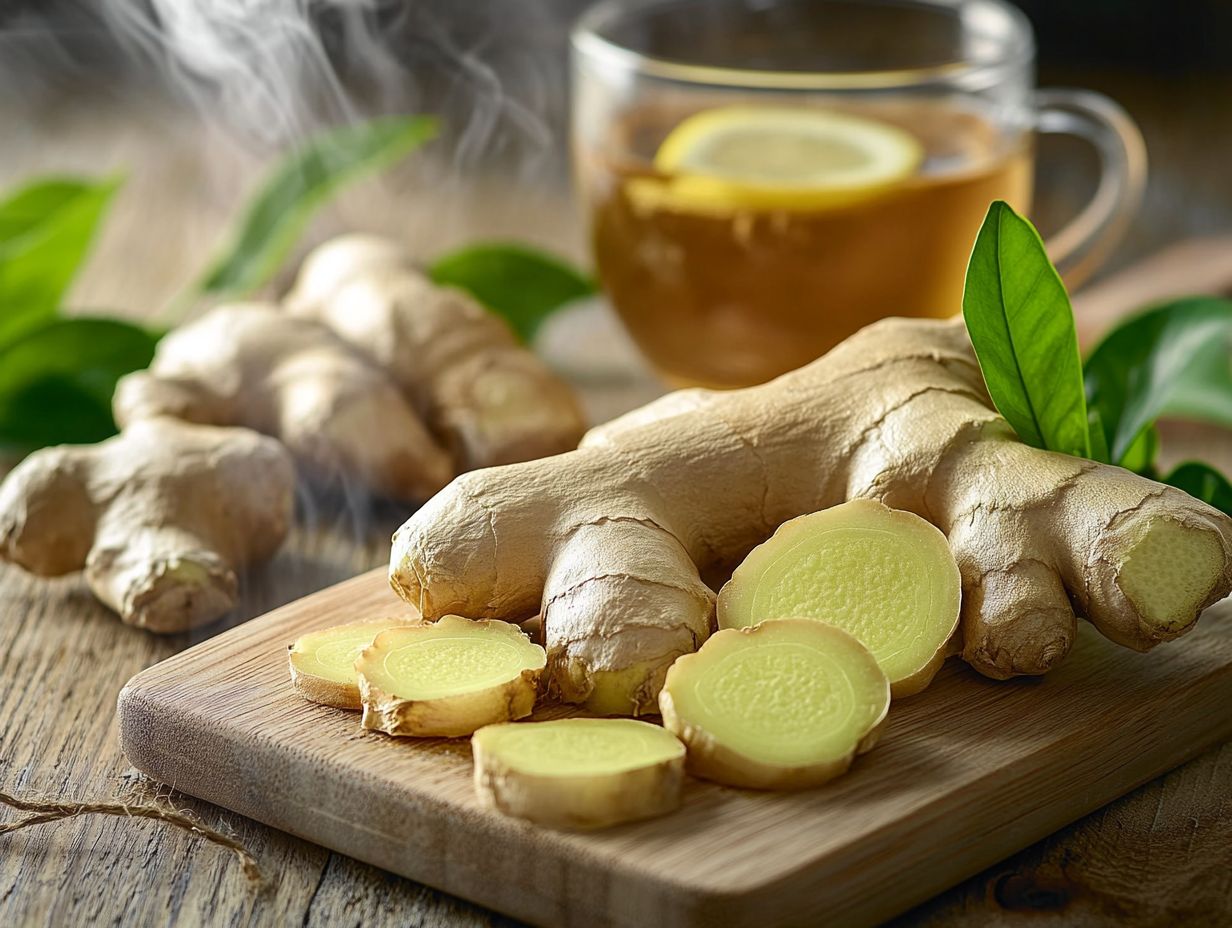Ginger: A Natural Remedy for Nausea
Ginger, with its vibrant flavor and captivating aroma, has been revered for both its culinary appeal and medicinal benefits. For centuries, ginger has been a go-to natural remedy for many ailments.
In this article, you ll discover the remarkable advantages of ginger, especially its prowess as a natural remedy for nausea. We delve into its traditional applications and contemporary scientific findings, revealing how ginger alleviates discomfort.
You ll learn about various forms such as teas and supplements that you can seamlessly integrate into your daily routine. We will also outline important precautions to keep in mind, ensuring you can enjoy this potent root both safely and delightfully.
Contents
- Key Takeaways:
- What Is Ginger?
- Ginger as a Natural Remedy
- How Ginger Helps with Nausea
- Forms of Ginger for Nausea Relief
- Potential Side Effects and Precautions
- Incorporating Ginger into Your Diet
- Preguntas Frecuentes
- Qu es el jengibre y c mo ayuda con las n useas?
- C mo se puede consumir el jengibre como un remedio natural para las n useas?
- Es seguro usar jengibre como un remedio natural para las n useas?
- Se puede usar el jengibre para aliviar las n useas durante el embarazo?
- Existen efectos secundarios al usar jengibre como un remedio natural para las n useas?
- Con qu frecuencia se debe consumir jengibre como un remedio natural para las n useas?
Key Takeaways:

Ginger is a versatile plant with properties that make it an effective natural remedy for nausea. It has been used traditionally and continues to be used in modern medicine for its ability to reduce nausea. Scientific evidence shows that ginger can help with nausea by influencing the nervous system and digestive processes. It comes in various forms, including teas and supplements, making it easily accessible for relief. While ginger is generally safe for most individuals, precautions should be taken for those with certain medical conditions or taking specific medications. You can easily incorporate ginger into meals and recipes to reap its benefits.
What Is Ginger?
Ginger, scientifically known as Zingiber officinale, is a remarkable flowering plant from Southeast Asia, celebrated for its aromatic rhizome. This rhizome isn’t just a culinary delight; it also boasts a rich history in traditional medicine.
You might find yourself drawn to ginger for its extensive health benefits, particularly when alleviating gastrointestinal issues, nausea, and inflammation.
Whether you enjoy ginger fresh, in dried powder form, or brewed as a soothing tea, it serves as a versatile natural remedy. Its adaptability extends to forms like ginger supplements, essential oils, and even ginger ale, each offering unique advantages for enhancing your health and wellness.
Overview of the Plant and Its Properties
Ginger, or Zingiber officinale, is a remarkable plant that you’ll appreciate for both its culinary flair and impressive health benefits. Notably, it offers anti-inflammatory properties and supports digestive wellness.
As a flowering plant in the Zingiberaceae family, it boasts powerful natural compounds that help promote health, such as gingerol, shogaol, and zingerone. These compounds enhance ginger’s therapeutic potential.
Research indicates that ginger can effectively combat nausea. This makes it an excellent choice for those undergoing chemotherapy or dealing with motion sickness.
The antioxidant properties of these compounds play a vital role in fighting oxidative stress and bolstering immune health. Incorporating ginger into your diet has been linked to lower blood sugar levels and improved heart health, emphasizing its significance in both traditional practices and contemporary medicine.
Ginger as a Natural Remedy
Ginger has been revered for centuries as a natural remedy for many ailments. It is particularly renowned for its effectiveness in alleviating nausea associated with chemotherapy and postoperative recovery.
This time-honored practice finds its origins in both Asian and Arabic medicine. There, ginger is celebrated for its remarkable ability to provide relief without the unwelcome side effects often linked to pharmaceutical alternatives.
Traditional and Modern Uses for Nausea
Both traditional and modern medicine acknowledge ginger’s remarkable effectiveness as a remedy for nausea. Its applications span from ancient herbal practices to contemporary treatments for chemotherapy-induced nausea.
Throughout history, this powerful root has been embraced by various cultures. In Indian Ayurvedic medicine, it has been used to alleviate digestive issues, while Chinese traditional practices recommend it for motion sickness.
In today s healthcare landscape, many professionals advocate for ginger supplementation as a natural alternative to pharmaceuticals, especially for pregnant women dealing with morning sickness. Clinical studies bolster its reputation, suggesting that ginger can effectively reduce both the severity and frequency of nausea in chemotherapy patients. This underscores its lasting significance in both holistic and conventional treatment approaches.
How Ginger Helps with Nausea

Ginger effectively alleviates nausea. Scientific research supports its unique mechanisms that address nausea at the source.
Studies show that ginger influences gastrointestinal issues due to its anti-inflammatory properties. It offers relief for conditions like motion sickness and nausea linked to chemotherapy.
Understanding the optimal ginger dosage can amplify its therapeutic benefits.
Scientific Evidence and Mechanisms of Action
Numerous studies reveal how ginger operates. It effectively alleviates nausea via different pathways in the body.
Ginger is rich in active ingredients like gingerol and shogaol. These compounds interact with the gastrointestinal tract and central nervous system.
By influencing neurotransmitter activity, especially serotonin and dopamine, ginger helps prevent nausea. Its anti-inflammatory properties calm the stomach lining and enhance gastric motility.
Research also suggests that these compounds may help cells manage stress. Therefore, ginger serves as a remedy for motion sickness and morning sickness.
Forms of Ginger for Nausea Relief
Ginger comes in various forms, catering to your preferences. Each offers effective nausea relief.
You can brew traditional ginger tea with fresh ginger or ginger powder. Alternatively, you might choose modern ginger supplements or a refreshing ginger ale.
Ginger essential oil offers an aromatic alternative. It can be applied topically or used in diffusers, enhancing the versatility of ginger as a remedy.
Teas, Supplements, and Other Options
Among ginger forms, you’ll find ginger tea, ginger powder, and ginger supplements. Each has unique preparation methods and benefits for nausea.
Ginger tea is a soothing drink made by steeping fresh ginger slices in hot water. It provides warmth and comfort for digestive discomfort.
Ginger powder is a versatile kitchen staple. It adds a spicy kick to savory and sweet dishes alike.
If you prefer concentrated options, ginger supplements in capsule form provide a convenient way to access ginger s benefits.
These forms not only enhance your meals but also promote overall wellness due to their anti-inflammatory and antioxidant effects.
Potential Side Effects and Precautions
While ginger has many health benefits, it’s important to be aware of potential side effects. Mild issues like heartburn or an upset stomach can occur, especially with excessive amounts.
If you’re pregnant or taking certain medications, it’s wise to exercise caution. Consulting with a healthcare professional about ginger’s safety and potential interactions is a smart step before adding it to your routine.
Who Should Avoid Ginger and Possible Interactions

Certain individuals should approach ginger with caution or avoid it altogether. This is particularly important for those taking specific medications or dealing with certain health conditions that may interact negatively with ginger.
If you’re pregnant, it s often recommended to limit your ginger intake, as it could lead to complications. If you have blood-clotting disorders, be especially careful since ginger may affect blood clotting, which could increase the risk of bleeding.
If you’re on blood thinners like warfarin or using antidiabetic medications, consult with a healthcare provider to avoid potential negative interactions.
By understanding these factors, you can make informed health choices and minimize unwanted side effects associated with ginger consumption.
Incorporating Ginger into Your Diet
Incorporating ginger into your diet is a delightful experience and a journey toward enhanced well-being.
This versatile root offers a wealth of health benefits that extend beyond alleviating nausea. Explore exciting recipes that let ginger shine in your meals, along with easy tips for seamlessly integrating this zesty ingredient into your culinary repertoire.
Whether you re brewing a soothing cup of ginger tea or tossing fresh ginger into your stir-fries, the culinary possibilities are truly limitless.
Recipes and Tips for Adding Ginger to Meals
Incorporating ginger into your meals is effortless and rewarding. You can enjoy a variety of recipes that enhance flavor while delivering health benefits.
Start your day with invigorating smoothies revitalized by ginger, or savor refreshing salads drizzled with a zesty ginger dressing. The versatility of this remarkable root knows no bounds.
Add ginger to marinades for your favorite proteins; its natural warmth tenderizes and infuses delightful spice. This elevates the flavors of your dishes while supporting digestion and boosting immune function.
With a touch of creativity, you can weave this aromatic ingredient into nearly every culinary endeavor, turning everyday foods into extraordinary dining experiences.
Preguntas Frecuentes
Qu es el jengibre y c mo ayuda con las n useas?
El jengibre es una planta con flores que se ha utilizado durante siglos como un remedio natural para diversas dolencias, incluidas las n useas. Contiene compuestos que ayudan a calmar el sistema digestivo y reducir las sensaciones de n useas.
C mo se puede consumir el jengibre como un remedio natural para las n useas?

Hay varias formas de consumir jengibre por sus propiedades para aliviar las n useas. Se puede comer crudo, cocido o seco, a adir a platos como especia, o consumir en forma de t de jengibre o bebida de jengibre.
Tambi n est n disponibles suplementos de jengibre en forma de p ldora o c psula.
Es seguro usar jengibre como un remedio natural para las n useas?
S , el jengibre se considera generalmente seguro y no t xico cuando se consume en cantidades moderadas. Sin embargo, siempre es mejor consultar con un profesional de la salud antes de usar jengibre como un remedio, especialmente si tienes una condici n m dica preexistente.
Se puede usar el jengibre para aliviar las n useas durante el embarazo?
Se ha conocido que el jengibre ayuda a aliviar las n useas relacionadas con el embarazo, com nmente conocidas como n useas matutinas. Es importante consultar con tu m dico antes de usar jengibre como un remedio durante el embarazo para asegurarte de que sea seguro para ti y tu beb .
Prueba a incorporar jengibre en tu dieta y consulta a un profesional de salud para m s informaci n personalizada!
Existen efectos secundarios al usar jengibre como un remedio natural para las n useas?
El jengibre es generalmente bien tolerado. No suele causar efectos secundarios significativos, pero algunas personas pueden tener molestias digestivas leves o acidez estomacal al consumirlo en grandes cantidades.
Comienza con dosis peque as para ver c mo te sientes.
Con qu frecuencia se debe consumir jengibre como un remedio natural para las n useas?
La frecuencia de consumo puede variar seg n la persona y la gravedad de los s ntomas. Consulta a un profesional de la salud para obtener consejos personalizados sobre la dosis y la frecuencia adecuadas.






